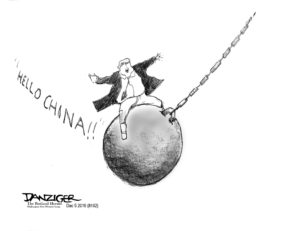By Francis Moriarty
HONG KONG — This is about the seven million people here who are not political refugees and don’t want to be. They are nearly all Chinese but, unlike their Taiwan cousins, do not have a freely elected leader who can call an incoming U.S. president. America was once committed to protecting these people’s rights and democratic wishes as a matter of policy. What are the chances this might be policy again? …
 Hong Kong’s China-installed leader, Chief Executive C.Y. Leung, is using every available tool – including the courts — to crack down on dissenters known as localists, a few of whom have the audacity to imagine independence from China. …. Beijing is now energetically involved in banning separatism from political discourse; Mr. Leung says it shouldn’t even be discussed in schools. The localists’ demands touch the Communist Party’s third rail. No one may dream of independence. Not the Buddhists of Tibet and Inner Mongolia, not the Moslems of Xinjiang province, not the Taiwanese who democratically elected President Tsai Ing-wen, and certainly not the residents of Hong Kong, the former British colony. …
Hong Kong’s China-installed leader, Chief Executive C.Y. Leung, is using every available tool – including the courts — to crack down on dissenters known as localists, a few of whom have the audacity to imagine independence from China. …. Beijing is now energetically involved in banning separatism from political discourse; Mr. Leung says it shouldn’t even be discussed in schools. The localists’ demands touch the Communist Party’s third rail. No one may dream of independence. Not the Buddhists of Tibet and Inner Mongolia, not the Moslems of Xinjiang province, not the Taiwanese who democratically elected President Tsai Ing-wen, and certainly not the residents of Hong Kong, the former British colony. …
Meanwhile, China’s President Xi Jinping has launched an anti-corruption war that is a purge by another name. … No surprise, then, that any mention of federalism is forbidden. The line is clear: China is a unitary state. All power flows from the center and no power is retained by any lower entity. The message is hammered home: Any authority you enjoy flows from Beijing’s largesse and caring. Don’t assume it lasts. What the center giveth, it also taketh away. …
A prime example is the Basic Law, Hong Kong’s constitutional basis. Based on a treaty between China and Britain, it is a national law promulgated by Beijing. It promises a high degree of autonomy and Hong Kong people administering Hong Kong. Now the city is being sternly reminded that the freedoms and other guarantees contained in it are gifted by Beijing. They are warned daily that one cannot have liberties, greater than any enjoyed on the mainland. … The bipartisan U.S.-Hong Kong Policy Act of 1992 committed America to support Hong Kong’s freedoms and democratic path. That law has expired. But Senators Marco Rubio and Tom Cotton, seeking to revive it, have recently reintroduced the Hong Kong Human Rights and Democracy Act. If passed, it would oblige the administration to hold China accountable for upholding its promises to Hong Kong. Will Mr. Trump support it?
SEE COMPLETE TEXT

You must be logged in to post a comment Login